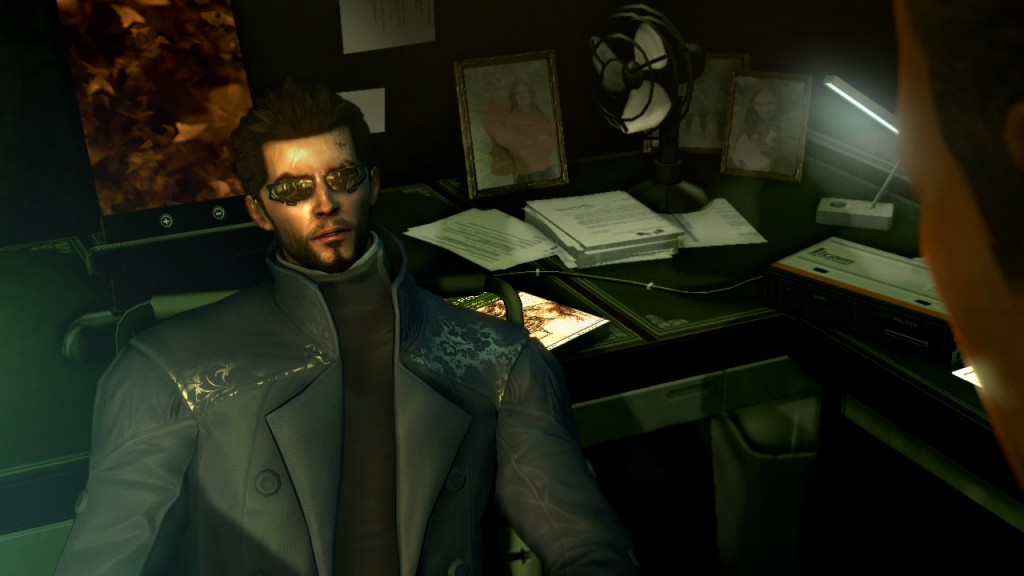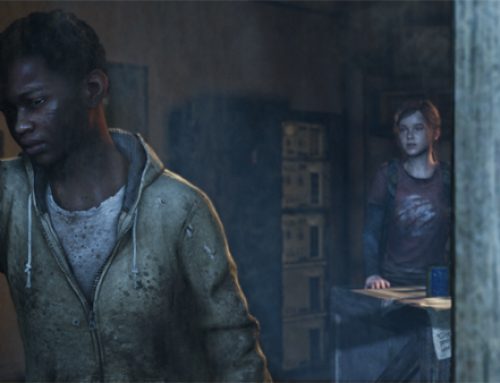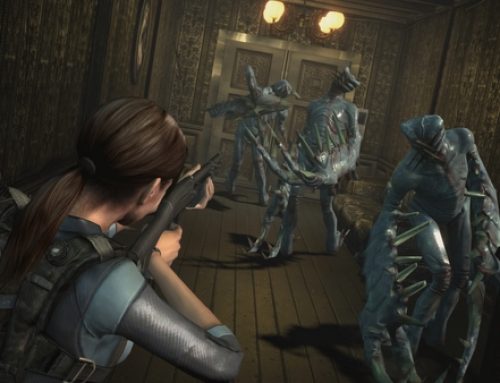
Adam Jensen, the protagonist in "Deus Ex: Human Revolution" has wardrobe straight out of "The Matrix" and a husky voice that would make Christian Bale's Batman blush..
Over the past few years, developers looking to tell great stories have increasingly made video games easier, so everyone can finish them. Hardboiled detective stories “L.A. Noire” and “Heavy Rain” went this route, and both won critical acclaim for tackling players’ low completion rates head on.
“Deus Ex: Human Revolution” (rated M, $60 for Xbox 360 or PlayStation 3, $50 for PC) sees that approach, watches it from an air duct, sneaks up behind it and murders it stealthily from the shadows before hiding its corpse behind some boxes. It’s an old-school gamer’s game, replete with obtuse battles against heavily armored bosses, computer-hacking minigames and punishing stealth missions that require players to traverse buildings full of enemies while remaining undetected. Oh, and you’ll have to manually save your progress constantly because the autosave feature is unreliable.
Gamers with the skill and, most important, patience the new “Deus Ex” requires will be rewarded with a gripping tale of corporate espionage and political subterfuge, along with some of the best level design video games have to offer.
“Human Revolution” serves as a prequel to two “Deus Ex” games released at the beginning of the last decade. It’s set in 2027, the cusp of a new era that will see corporations with their own private armies eclipse nations as geopolitical centers of gravity. A handful of biotech companies are pushing a new field of study known as “augmentations,” cybernetic implants that allow their wearers to gain physical or social advantages over their unaugmented peers.
Players control Adam Jensen, the head of security for Sarif Industries, a leader in augmentations. As the game begins, Sarif’s scientists, including Jensen’s ex-girlfriend, are on the cusp of addressing Congress and making a huge announcement that will supposedly democratize augments, bringing about an end to an era of haves and have-nots. But then a massive invasion of Sarif’s Detroit headquarters goes down, and a small army of well-trained mercenaries leaves a trail of bodies in its wake, nearly killing Jensen in the process.
Months later, a rebuilt, newly augmented Jensen must get to the bottom of what’s behind the break-in, and seek revenge for the deaths of his colleagues.
How Jensen accomplishes this goal is largely up to players. Progress through the game is largely dictated by which augmentations players choose to unlock as they play. You can take a noncombat approach, which emphasizes stealth and smooth talking. Or you can beef up Jensen’s pain tolerance and weapons-handling, and go in guns blazing, sort of. (For those who abhor violence, a tranquilizer rifle offers a kill-free path, in which the only lives you end are those of the aforementioned end-stage bosses.)
Regardless of which approach you take, Jensen is probably going to spend a fair amount of time sneaking through air ducts and slinking around amongst office cubicles, even if it’s just to gain a tactical advantage for more efficient murdering.
This style of gameplay is, frankly, not for everyone. Finding an optimal path through a level without having Jensen’s cover blown requires a certain amount of trial and error as you memorize guards’ patrol patterns and scout around for hiding places.
Patient gamers, however, will be amazed at all the stuff there is to see, do and decide in “Deus Ex.” Each of the huge levels offers multiple paths and solutions that support nearly every play style, so long as Jensen takes the time to do some fieldwork. Computer terminals waiting to be hacked are everywhere, but thanks to people’s tendencies to write their passwords on Post-It notes, the savvy sleuth who’s not so great at hacking can usually gain access to critical information. Likewise, those willing to eavesdrop on conversations will overhear useful secrets, such as alternate entrances.
At times, though, these hints can seem overly “gamey,” compromising “Deus Ex’s” ability to immerse its players in its fiction. At one point, I overheard a guard tell a prostitute that he couldn’t let her into a building, but there was a secret entrance via an adjacent building, or that she could crawl through the sewers. To get in via the fourth-floor method, my Jensen had to jump between ducts and air conditioning units four stories above the ground, use an augmentation to punch through a concrete wall, subdue two guards and drop about 40 feet down an elevator shaft, hitting girders on the way down to slow his fall. Do hookers get hazard pay?
Similarly, “Human Revolution” features a number of dated video game conventions that don’t jibe with its mature, satisfying storytelling. For instance, the majority of Jensen’s cybernetic enhancements consume energy. To replenish that energy, Jensen has to literally eat energy bars.
Furthermore, the sneaking-around aspects of “Human Revolution” aren’t exactly cutting edge. Once Jensen is spotted, the player really only need sneak to a slightly different area and wait a minute or two before the guards give up their search and resume regular patrols. This often plays out comically, such as when a guard looking through a window sees Jensen inside a room with only one entrance, then is stumped upon entering the room because the player has positioned Jensen behind the door the guard opened. It’s enough to make you wonder if the guards ever won a game of hide and seek when they were kids.
That said, all these quirks and oddities have a certain unified logic about them, and after a few hours of playing, they’ll become second nature for most players, allowing the gripping whodunit to unfurl masterfully. Players willing to stick with “Human Revolution” despite its quirks, and pay attention to Jensen’s surroundings, will revel in finely crafted fiction that rivals that of games like “Mass Effect” and “Fallout 3.”
This craftsmanship extends beyond the story to the world itself. As I guided Jensen from one objective to the next, I talked to as many nonplayer characters as possible and watched for electronic newspapers and books. The process of sifting through and discovering the details Eidos Montreal has poured into “Human Revolution” traffics in the same thrills as listening to “BioShock’s” audio diaries for the first time, or walking around and talking to all the different races aboard “Mass Effect’s” Citadel space station. If you’re a sucker for a good backstory, “Deus Ex” won’t leave you wanting.
Follow Eric Wittmershaus on Twitter and join the GameWit blog group on Facebook.



